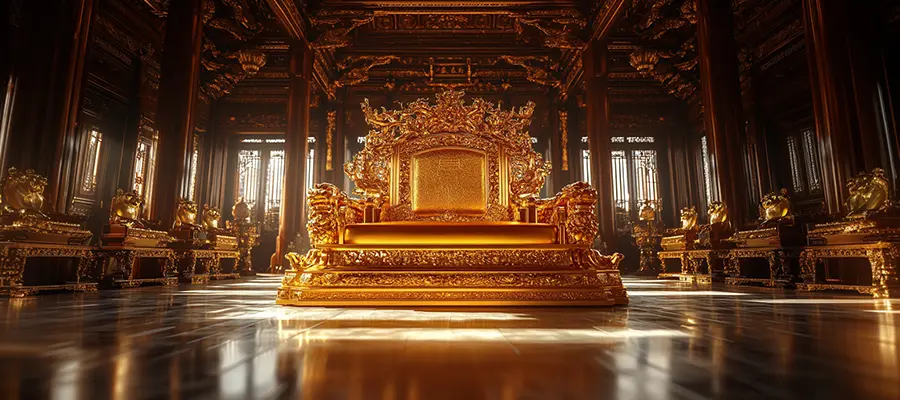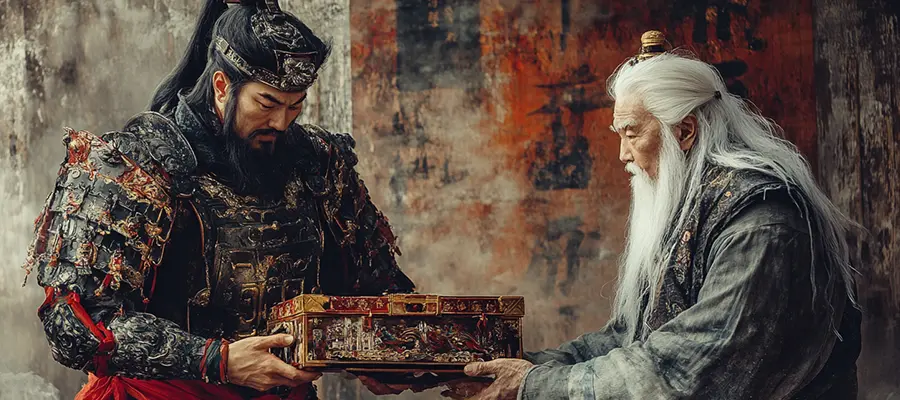Chapter 4: The Deposition Of The Emperor; Prince Of Chenliu Becomes Emperor; Schemes Against Dong Zhuo; Cao Cao Presents A Sword
4 minutes read
Dong Zhuo was about to kill Yuan Shao when Li Ru intervened, saying, “Do not act rashly while matters remain uncertain.”
Yuan Shao, sword unsheathed, stormed out, resigned his office at the east gate, and departed for Jizhou.
Dong Zhuo turned to Imperial Guardian Yuan Wei, saying, “Your nephew was insolent, but I forgive him for your sake. What do you think of my plan?”
Yuan Wei replied, “Do as you see fit.”
“If anyone opposes, they will face military law!” Dong Zhuo declared. The terrified ministers pledged obedience, and the assembly ended.
Later, Dong Zhuo sought advice from Zhou Bi and Wu Qiong regarding Yuan Shao’s departure. Zhou Bi warned, “Yuan Shao’s anger could provoke rebellion. His family’s influence is vast, and he could rally warriors to threaten the east.”
Wu Qiong added, “Yuan Shao lacks decisiveness and is no real threat. Still, granting him a title might secure his loyalty.”
Dong Zhuo agreed and appointed Yuan Shao as Governor of Bohai.

On the first day of the ninth month, Dong Zhuo summoned officials to the Hall of Virtue. Sword in hand, he declared, “The Emperor is weak and unfit to rule. Hear my decree!”
Li Ru read aloud: “Emperor Bian lacks virtue and has brought chaos. The sage Prince of Chenliu, Liu Xian, shall ascend the throne. Emperor Bian is deposed and made Prince of Hongnong, while Empress He retires from court.”
Dong Zhuo ordered the young emperor to relinquish his seal, kneel, and accept the title of Prince of Hongnong. Both the deposed emperor and Empress He wept bitterly, moving the court to tears.
One minister, Ding Guan, denounced Dong Zhuo, shouting, “This outrage cannot stand!” He attacked Dong Zhuo but was overpowered and executed, dying with defiance on his lips.
The nine-year-old Liu Xian was installed as Emperor, with the reign renamed Inauguration of Tranquillity (190 CE). Dong Zhuo became Prime Minister, wielding immense power. Arrogant and unrestrained, he amassed wealth, ignored protocol, and violated imperial traditions.
Dong Zhuo sought to bolster his reputation by recruiting renowned figures like Cai Yong, who reluctantly joined under threat of extermination. Despite Dong Zhuo’s generosity, his tyranny deepened.
Meanwhile, the deposed emperor, his mother, and consort Lady Tang were confined to the Palace of Forever Calm, where their provisions dwindled. Moved by the sight of swallows outside, the young emperor composed a sorrowful poem. A spy delivered the poem to Dong Zhuo, who seized it as justification to eliminate them.
Li Ru led men to the palace with poisoned wine. The Empress resisted, demanding to share the cup if it was truly for “longevity.” Li Ru dropped the pretense and gave an ultimatum: drink or die.
Lady Tang pleaded to sacrifice herself to spare the others, but Li Ru dismissed her. The Empress cursed her brother, He Jin, for their plight, refusing the wine. Li Ru then forced the poison on the young emperor, strangled Lady Tang, and threw the Empress from a window.
Li Ru reported the deed to Dong Zhuo, who ordered their bodies buried outside the city. With no opposition left, Dong Zhuo’s atrocities escalated. He desecrated the imperial palace, defiled concubines, and even slept on the Dragon Couch.
Dong Zhuo once led his soldiers to Yangcheng during the spring festival, where villagers gathered. His troops surrounded the festival, looted it, and returned to Luoyang with carts of plunder, women prisoners, and over a thousand severed heads, falsely claiming victory over rebels. The heads were burned publicly, and the spoils distributed among the soldiers.
Wu Fu, a disgusted general, resolved to kill Dong Zhuo. Wearing armor beneath his robes and concealing a dagger, he attempted an assassination at court but was overpowered by Dong Zhuo’s strength until Lu Bu intervened and struck him down. As Wu Fu was dragged away, he defiantly declared Dong Zhuo a criminal who deserved death. He was executed on Dong Zhuo’s orders.

Thereafter, Dong Zhuo ensured heavy guards. Yuan Shao, hearing of Dong Zhuo’s tyranny, wrote to Minister Wang Yun, urging action. Wang Yun, though hesitant, gathered allies at a private party under the guise of his birthday. Moved by his lament over the state of the empire, Cao Cao vowed to kill Dong Zhuo, borrowing a jeweled sword for the task.
Cao Cao approached Dong Zhuo but hesitated when the opportunity arose. Dong Zhuo, spotting the reflection of the sword, questioned Cao Cao. Thinking quickly, Cao Cao presented the blade as a gift. Dong Zhuo accepted it, but his suspicions were aroused. That night, Cao Cao fled eastward, pursued by orders for his capture.
Caught at Zhongmou, Cao Cao posed as a merchant but was recognized by Magistrate Chen Gong. During a private interrogation, Cao Cao revealed his goal to overthrow Dong Zhuo. Inspired, Chen Gong freed him and abandoned his post to join Cao Cao.
On their journey, they sought shelter at the home of Lu Boshe, Cao Cao’s uncle. While waiting, they overheard the sharpening of a knife and talk of binding before killing. Fearing betrayal, they attacked, killing everyone in the household, only to discover the preparations were for slaughtering a pig. As they fled, they encountered Lu Boshe returning with wine and food. Cao Cao killed him, fearing retribution for the earlier massacre. Chen Gong was horrified, but Cao Cao coldly justified his actions: “Better to betray the world than let the world betray me.”
That night at an inn, Chen Gong, disillusioned by Cao Cao’s ruthlessness, considered killing him in his sleep.
Love my work? Buy me a coffee! Your support means the world. ❤️